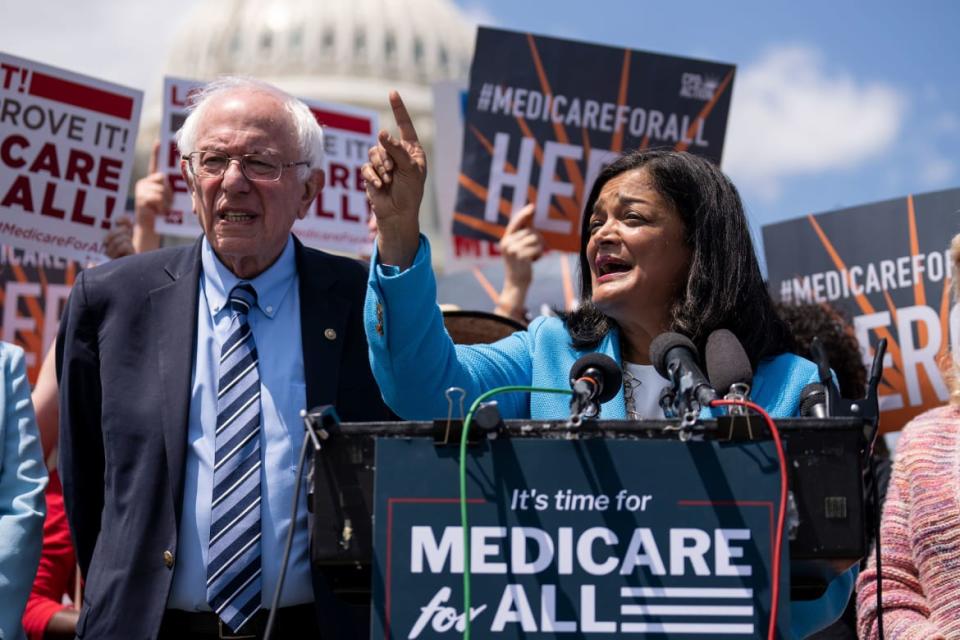Progressives’ Radical Dream Policies Don’t Even Exist

For several decades, the progressive economic agenda has centered around enacting single-payer health care (often dubbed “Medicare For All”). Progressive candidates, think tanks, lobbying organizations, and grassroots activists have campaigned, organized, and rallied for it.
Thus, the failure of single-payer to gain broader traction has been blamed on corporate greed, right-wing billionaires, public ignorance, and a corrupt political system.
But there is a more basic reason single-payer has not come close to enactment: No implementable legislative proposal even exists.
What Happened to Medicare For All?
This may surprise progressives who regularly point to “Medicare-For-All” legislation authored by Sen. Bernie Sanders (D-VT) and Rep. Pramila Jayapal (D-WA). Yet these “skeleton bills” offer only a general approach and lack the basic detail necessary to be implemented if enacted.
And the skeleton bills go beyond health care. Key progressive priorities lacking serious legislation include taxing the rich, slashing defense spending, and even meeting aggressive climate targets.
The issue is not that their blueprints are misguided or would shift policy in the wrong direction (although as a non-progressive I am generally skeptical of such approaches). Rather, the leading progressive bills and proposals contain virtually no policy substance whatsoever. They are empty messaging bills. Building coalitions and winning elections will not matter until progressives can turn slogans into coherent legislation.
Within “Medicare-For-All,” the Sanders and Jayapal bills are specific on the easy part—generously expanding benefits to new populations and procedures at a cost of roughly $6 trillion over the decade. But the entire justification of the new system is predicated on the key promises of: 1) a massive reduction in national health spending that would be accomplished with a new system for paying doctors, hospitals, and medical providers that eliminates excess profits and administrative bloat; and 2) a new $32 trillion “single-payer tax that can replace the $32 trillion in premiums, deductibles, co-pays, and out-of-pocket spending projected in the private health economy over the next decade.”
Mainstream economic analysts—including the Urban Institute, CBO, and others—have questioned whether a new payment system can save more than $6 trillion over the decade (which would merely offset the proposal’s $6 trillion coverage expansion) without cutting payment rates to levels that would drive providers out of business. Critics have also questioned how to design a plausible $32 trillion tax to replace private health spending.
How do the Sanders and Jayapal bills answer the two fundamental questions of operating Medicare-For-All? They have no answer. They punt. They simply instruct federal agencies to figure out a new payment system. And on the new single-payer tax, there is no financing section at all. No tax. Nothing to fund health care. The bills are so empty that the Congressional Budget Office cannot even score their costs or effects.
Progressives Should Support the GOP’s Social Security Reform Efforts
The single-payer emptiness goes beyond these bills. Even progressive academics and think tanks routinely release frameworks promising ambitious single-payer health savings targets—with no specific payment system that could be analyzed for actual savings or the effect on medical providers.
On financing, Sanders in 2020 offered a campaign proposal that would finance only $13 trillion of the $32 trillion ten-year cost, and Massachusetts Sen. Elizabeth Warren’s Medicare-For-All proposal also came up $20 trillion short.
An entire industry of progressive think tanks, economists, lawmakers, and activists have all failed to come up with a specific financing plan. And it’s surely not because no one thought to try and design one, or because a brilliant tax plan is being kept secret. A decade ago, Sanders’ home state of Vermont enacted and then repealed the nation’s first state-based single-payer health care system because state officials could not figure out a plausible tax to replace the private health spending.

Sen. Bernie Sanders (I-VT) looks on as Rep. Pramila Jayapal (D-WA) during a news conference to announce the re-introduction of the Medicare For All Act of 2023, outside the U.S. Capitol May 17, 2023 in Washington, DC.
Even the “just paste the European systems into a bill” talking point is shallow and unserious.
European systems are far less generous than American progressive proposals, and the U.S. has a more extensive health infrastructure—with more technology, roomier hospitals, and more drug research—that requires its own payment system to match. It is no more feasible to impose Scandinavian payment rates on America’s larger health infrastructure than it is to impose modest Scandinavian home prices for larger American houses.
Until progressive leaders can answer the two basic questions of how specifically the new payment system would save countless trillions, and which “single-payer tax” can replace private health spending, there is no serious “Medicare-For-All” proposal—just a wish-list of new benefits.
The same lack of substance plagues other progressive priorities.
This includes the oft-repeated idea that taxing the rich can finance the next decade’s projected $20 trillion budget deficit plus massive expansions within climate, health care, Social Security, climate, education, antipoverty, infrastructure, family leave, and child tax credits.
Contrarian Defenses of RFK Jr. Are Not Brave—They’re Boring
Yet there is not a single congressional bill that specifies upper-income tax hikes exceeding $3 trillion over the decade, and most bills recycle the same few tax hikes to pay for various spending proposals. Even Bernie Sanders’ 2020 comprehensive campaign tax agenda offered $11 trillion in upper-income taxes over the decade, which covered only a small fraction of his spending promises (and none of the soaring baseline deficits).
“Tax the rich” rarely moves beyond vague rhetoric, because not even 100 percent tax rates on incomes over $500,000 could balance the budget, and seizing all $4.5 trillion of billionaire wealth would fund the federal government one-time for nine months (while liquidating much of the stock market).
On the matter of the nation’s defenses, the House Democrats’ “Defense Spending Reduction Caucus” came together to craft the “People Over Pentagon Act of 2022” that would require an immediate $100 billion reduction in defense spending.
Which Pentagon accounts would be reformed, and how would they reshape the armed forces? The lawmakers apparently don’t know. The 333-word bill merely instructs the Secretary of Defense to ask the CBO for ideas to essentially redesign America’s military.
America’s Tragedy Is Its Culture of Fear—Armed With Millions of Guns
Seriously. This group of lawmakers could not identify a single specific defense cut, much less $100 billion worth.
On climate, the leading House and Senate bills merely pledge net-zero emissions by 2050 with no specific policies to get there. Seeking more substance, Congress in 2019 established the House Select Committee on the Climate Crisis to “develop recommendations on policies, strategies, and innovations to achieve substantial and permanent reductions in pollution and other activities that contribute to the climate crisis.” This 16-member bipartisan Congressional committee held 40 hearings over three-and-a-half years and was given the resources to summon the nation’s top scientists and economists to produce specific, implementable legislation to solve the climate crisis.
Instead, the committee merely wrote a report recommending that “Congress should pass legislation to establish a national goal of achieving net-zero greenhouse gas emissions by no later than 2050,” and calling on the president to develop carbon-control strategies.
Essentially, Congress created a special committee that wrote a plan to recommend that Congress draft a legislative plan that would in turn ask someone else to come up with a plan. There is still no specific legislative blueprint to achieve net-zero emissions.
Across these bills, progressives declare ambitious goals—health care for all, massive upper-income taxes, defense cuts, net-zero carbon emissions—and then draft short legislation assigning a commission or agency to figure out how to make them happen. Yet the specifics are never filled in because the ambitious promises themselves are often contradictory, unworkable, unpopular, and even mathematically impossible.
Of course, conservatives also make unworkable and impossible promises, such as tax cuts paying for themselves, balancing the budget by cutting “waste,” and replacing Obamacare.
Republicans Are Right to Demand a ‘Dirty’ Debt Limit Bill
However, progressives fancy themselves as more wonky, substantive, and policy-focused than MAGA conservatives. Moreover, conservatism defines itself more in opposition to complicated economic interventions, so it is less concerned with pushing wonky bills.
Progressives claim the government can accomplish bold and ambitious objectives. But their leaders have not done their homework turning aspirations into workable legislative proposals.
Too often, progressives promise enormous benefits, wave away basic questions of how the programs would work, and then angrily dismiss all criticism as bad-faith, evil, or corrupt. The result has been a lot of grassroots energy with scant legislative output.
Progressive proposals are not defeated by a cabal of sinister, bad faith actors, but rather by their own reliance on promising utopian solutions that even their leading advocates cannot turn into coherent legislation.
Brian Riedl is a senior fellow at the Manhattan Institute. Follow him on Twitter @Brian_Riedl.
Get the Daily Beast's biggest scoops and scandals delivered right to your inbox. Sign up now.
Stay informed and gain unlimited access to the Daily Beast's unmatched reporting. Subscribe now.

